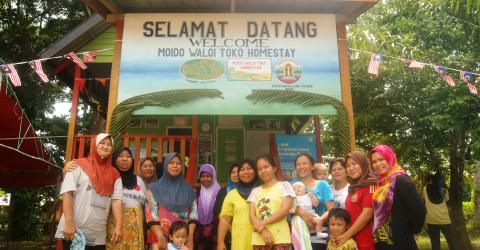
Women’s empowerment in ethno and eco-tourism creates positive impacts
Each day at a village called Abai in Malaysia’s largest Ramsar site (the Lower Kinabatangan-Segama Wetlands), a mother is charting a future that connects her community back to their traditions and also promotes a functioning ecosystem.
Jainah Amid is raising four children while also serving as project coordinator for the Community Abai Project (CAP). This ethno- and eco-tourism initiative includes a diverse range of elements: home-stays, forest restoration, tree nurseries, organic farming, water quality monitoring, cultural performances, tour guiding, food and beverage preparation, wildlife monitoring and communications. “I am a housewife, a project coordinator, home-stay programme member and I manage forest restoration in the Lower Kinabatangan Wildlife Sanctuary”, Jainah says. Along with 70 villagers, 46 of them women, Jainah is creating positive impacts here in the Bornean state of Sabah. “Apart from the many different tasks we handle daily, we help our husbands to make traditional fishing traps that are crafted from non-timber forest products collected around our village”, she says.
Jainah’s husband is also involved in CAP and has supported the work for the past five years. Prior to the inception of CAP, women were in the background. Jainah says roles have started to shift now that women are directly involved in the project. “In the past, we were in our own way doing all sorts of work, but what we did went unseen. Today, women in my village and the tasks that we carry out are receiving the acknowledgement of men. We are contributing to the diversification of income sources and we are filling leadership and technical roles. We are encouraging our daughters also to get involved in the many activities of CAP”.
These women’s husbands, fathers and brothers now act as their strongest supporters. According to Jainah, “Women here have gone through a lot in managing this project. There were many meaningful moments which helped us gain experience in collectively developing a sustainable community tourism initiative. I speak for the women here when I say our hope is that the work we do will inspire other women and their families in the Lower Kinabatangan-Segama Wetlands Ramsar Site”.
For more on the project, visit www.moidowaloihomestay.com
By Jaswinder Kler and Neville Yapp, LEAP (Land Empowerment Animals People)
© Image courtesy of Neville Yapp